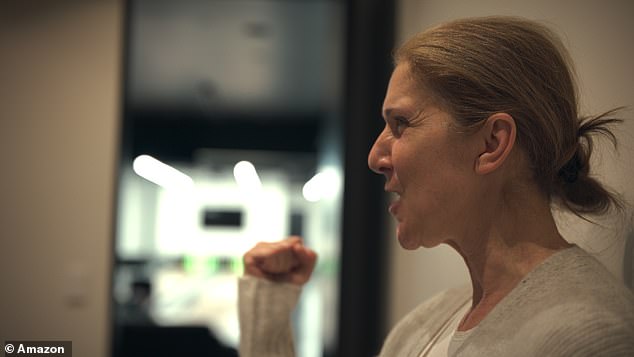The debilitating stiff-person syndrome suffered by Celine Dion and one in a million others causes muscle spasms so powerful they can break bones.
A newly released clip from Celine Dion’s biographical documentary showed the Canadian singer stiff as a board and moaning in pain as muscle spasms took over her body.
Doctors say this rare condition is caused by an accelerated immune system reaction that attacks the body’s own cells, specifically those that regulate motor function.
One doctor told DailyMail.com that with stiff person syndrome (SPS), it is “as if the body’s ‘off switch’ for muscle contraction is not working properly, leaving the muscles in a constant state of activation.”
In her documentary, Celine Dion suffers a severe, painful full-body spasm that leaves her unable to move a muscle.
In the documentary, Ms. Dion is doing physical therapy exercises when the spasms overcome her and she has to lie on her side.
His wrist is stiff and bent and he cannot move it. Her face is contorted with pain and she cries but she cannot move her neck or head.
Dr James Chung, autoimmune disease expert and medical director of Kyverna Therapeutics, told DailyMail.com: ‘Patients with (stiff person syndrome) often describe their pain as a sharp, intense pain that hurts when they move. Many report a constant underlying muscle tension, as if their body is perpetually braced.
‘During acute spasms, patients have compared the sensation to severe cramps or their muscles “locked” in place. Some describe a burning or electrical sensation accompanying the spasms.

Dr. James Chung (pictured) explained in SPS that the body’s own immune system inhibits the production of a neurotransmitter that regulates muscle movements and contractions.
Her legs also seem completely immobilized in front of her.
During her crisis, Ms. Dion’s doctor administers a benzodiazepine spray to relieve anxiety and reduce muscle spasms.
Her spasms last at least 30 minutes before she can sit up on her own.
Mrs. Dion later says, “Every time something like this happens, I feel so embarrassed.”
“I don’t know how to put it, you know, not having control over yourself.”
SPS is an attack on the body itself, specifically the central nervous system (CNS). SPS produces antibodies that attack the proteins responsible for regulating muscle contractions.
This attack reduces levels of an enzyme that produces an important CNS neurotransmitter called GABA, which generally relaxes muscles. But when its levels are reduced, the muscles do not receive signals to release tension, causing prolonged muscle contraction.
External stimuli, such as bright lights or loud noises, often cause spasms, and emotional distress can cause or worsen involuntary movements.
Dr Chung said: “This autoimmune attack causes the muscles to no longer have proper control over how they contract and relax, leading to stiffness, reduced movement, excessive muscle tension and painful spasms.”

Celine Dion secretly dealt with stiff person syndrome for 17 years before going public with her diagnosis in 2022. The condition makes acting extremely difficult, but she is eager to return to her music career.
The spasms can last anywhere from seconds to an hour and have been described by patients like San Diego-based Carrie Jean Robinette as causing “excruciating pain” that leaves her “temporarily paralyzed” and “feeling like I’ve been physically hit.” .
She said: ‘Every day I am faced with this condition which looks different, sometimes every hour.
“Some days I walk unassisted, other days I need the forearm crutch, and most days I need a mobile chair if I’m going to walk more than 20 yards.”
SPS is extremely rare, affecting fewer than 5,000 Americans.
The disease is chronic and cannot be cured. SPS itself is not fatal, but patients can die from complications of the disease.
Muscle spasms and stiffness exacerbate the risk of falls and fatal injuries.
Muscle stiffness can also affect the muscles of the chest and diaphragm, leading to respiratory failure.
Some people may also experience problems with their autonomic nervous system, the network of nerves that regulates functions we don’t think about, including heart rate, blood pressure, and digestive function.
Treatment of the condition usually involves muscle relaxants such as diazepam and immunotherapy to reduce the number of antibody attacks in the body.
Pain management is crucial, but it cannot necessarily be managed with an opioid, which can be addictive.
Physical therapy, like what Ms. Dion does, is also essential for maintaining mobility and muscle strength over time.

